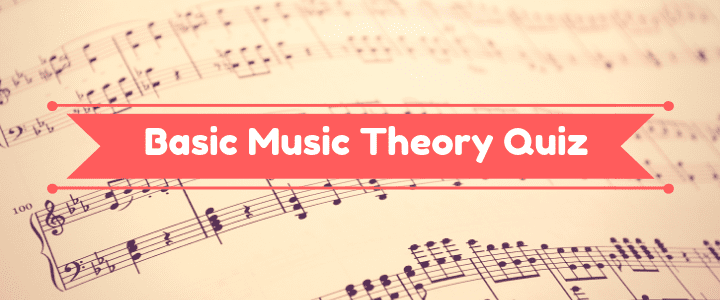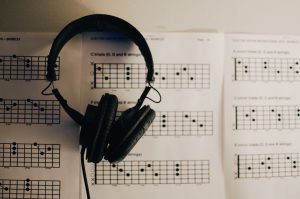
Test your knowledge of music with this innovative music theory quiz – and then keep reading to find even more fun quizzes you can take!
A knowledge of music theory is absolutely indispensable to musicians. For beginners, it can seem intimidating, but experienced musicians will attest that theory is well worth the effort needed to master it.
While you can certainly acquire proficiency on an instrument without a knowledge of theory, you’ll miss out on the depth of understanding that it provides. Music theory is also extremely useful for musicians.
Whether you’re taking online music lessons or just want to teach yourself more about music theory, this music theory quiz is sure to give you more information about where you stand and what you still need to learn.
Why Take a Music Theory Quiz?
Not sure whether you should invest the time in taking a music theory quiz? Here are a few reasons to consider setting aside a few minutes:
- Lets you understand where your passions lie in music
- Tests your knowledge so you know where to go next
- Helps you become a better music student!
Think of music theory as your tool box. It enables you to analyze, transcribe, and replicate songs. It also equips you to communicate effectively with other musicians.
Here’s a video that shows you just how important it is to learn music theory as a pianist specifically:
A sound knowledge of theory enables you to compose your own music with confidence and enjoy a whole world of possibilities!
Can you pass a music theory quiz for beginners? This quiz is an excellent way to test your knowledge of basic theory. Give it your best shot and if you get stuck, we’ll go over each answer in detail below.
Music Theory Quiz Online: Free Review
How did you score on our music theory test? Let us know in the comments section below! To check your work, here is a review of each question and answer.
1. The numbers at the beginning of a piece of music represent the: (C) Time signature.
The time signature indicates the meter of the music, with the upper number representing the number of beats per measure and the lower number indicating the value of each beat. For example, 4/4 tells you that you have four beats per measure, and the quarter note gets the beat.
2. The lines in the treble staff are, from bottom to top: (C) EGBDF.
Think, “Every Great Band Draws Fans” or “Every Good Boy Does Fine.” Don’t confuse this with the bass staff, which we asked about later in the quiz.
3. A 16th note will have the following: (B) Two flags.
These indicate that the beat has been subdivided twice. Sixteenth notes break a quarter note into four parts, for example. They are very common in music.
4. A dotted half note equals how many quarter notes? (B) Three.
One dot after a note indicates that half of that note’s value is added to the duration. A half note is equal to two quarter notes, so the dot adds one quarter note. Now you just have to solve the simple math equation: 2+1=3.
Keep Reading to Learn More About Music Theory…
5. The musical term used to describe differences in volume is: (C) Dynamics.
This is a very expressive element of music. In the most basic sense, pp = very quiet, p = quiet, mp = moderately quiet, mf = moderately loud, f = loud, ff = very loud. The performer has a bit of creative license with interpretation.
6. The symbol used to denote the range of a particular staff is a: (C) Clef.
The clef at the beginning of a staff indicates the pitches and range of that piece of music. We use the treble clef, the bass clef, and the C clef. The rhythm clef is an exception, as it is used for non pitched percussion notation.
7. The small lines above or below a staff are called: (C) Ledger lines.
These indicate notes that extend beyond the range of the given staff. When reading the bass or treble staves, middle C will always be on a ledger line (one above the bass or one below the treble).
In the treble staff, any note A5 and above will be on ledger lines. In the bass staff, anything E2 and below will be on ledger lines. These are also used often in music.
8. The spaces in the bass staff, from bottom to top are: (C) ACEG.
Think, “All Cars Eat Gas.” Notice that this question is specifically asking about the spaces, not the lines.
More Music Theory Tests
Want to take another music theory quiz to sharpen your skills? Here are a few excellent resources to check out.
Music Theory Intervals Quiz
In music theory, the interval is the difference in pitch that exists between two sounds. If you’re trying to master the theory of intervals in music composition, you’ll want to check out these resources and quizzes:
- Interval Identification by Music Theory
- Music Interval Identification Ear Training Quiz
- Intervals by Quizizz
Music Theory Key Signatures Quiz
There are even quizzes you can take that will help you master key signatures! Here are a few options:
- Key Signatures Quiz by Quizizz
- Music Theory Key Signatures Quiz by ProProfs
- Key Signatures Identification Activity by Teoria
Music Theory Quiz App
You don’t have to rely on run-of-the-mill online quizzes to get a handle on music theory, either. There are plenty of apps that will allow you to take the learning (and the fun!) on the go.
Some of the best music theory quiz app choices include:
- EarMaster
- Music Theory Pro
- Theory Lessons
- Tenuto
- Music Tutor (great for learning sight reading!)
Music Theory Time Signature Quiz
Want to learn about the major time signature categories – including regular/irregular/simple/compound, and more – and then test your knowledge? Here are some great quizzes you can take and games you can play:
- MyMusicTheory Music Theory Time Signature Quiz
- Quizizz Time Signature Quiz
- Study.com Time Signatures Quiz
Music Theory Meter Quiz
Meter is yet another essential element of music theory that you will need to master if you want to become the best musician possible. Here are some quizzes you can take:
- Music Theory Meter Quiz on Quizlet
- Rhythm and Meter Multiple-Choice Test from Review Game Zone
- Music Theory Fundamentals Simple Meter Quiz
Do You Have What it Takes to Be a Master Musician?
Take a music theory quiz and find out for yourself!
Enjoy exploring music theory and the freedom of expression that it can afford you. Music theory translates to all instruments, so learning it will make you a more versatile and well-rounded musician!
If you want to take your knowledge of theory to the next level, you can easily find affordable and reputable music theory instructors for online or local lessons.
 Post Author: Tracy D.
Post Author: Tracy D.Tracy D. teaches music theory, guitar, piano and more in Edmond, OK, as well as online. She’s been teaching since 2010 and has her Bachelor’s in Music Education from Oklahoma Christian University. Learn more about Tracy here!
[pro_ad_display_adzone id=”74612″]
Jessica Dais
